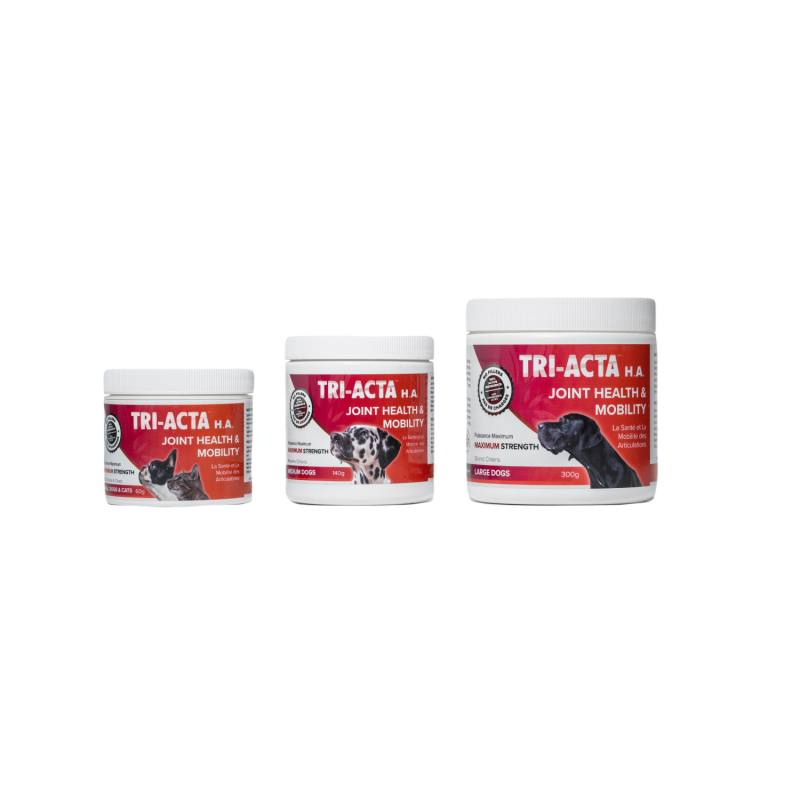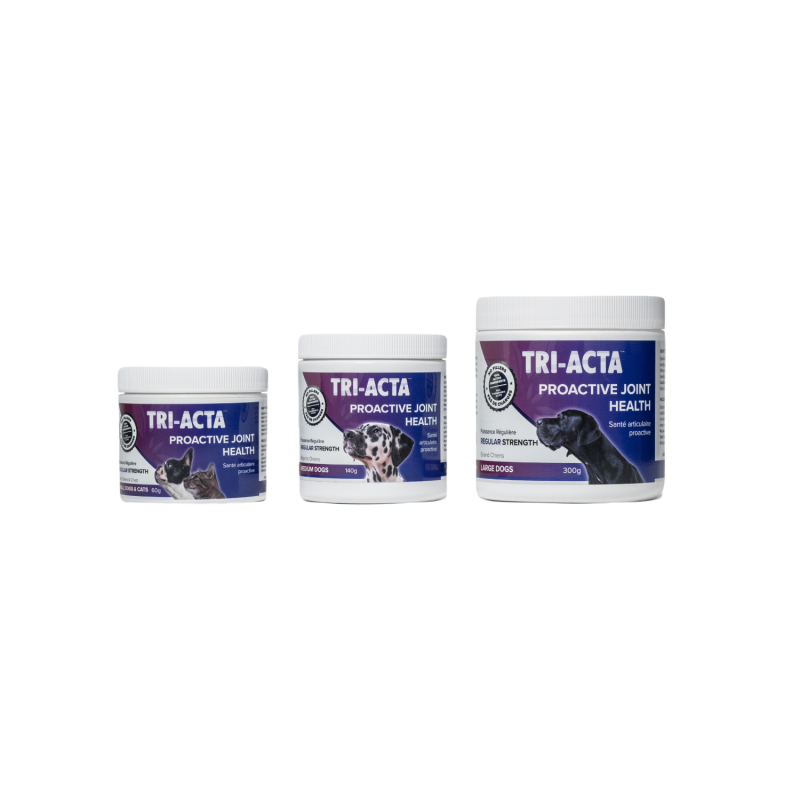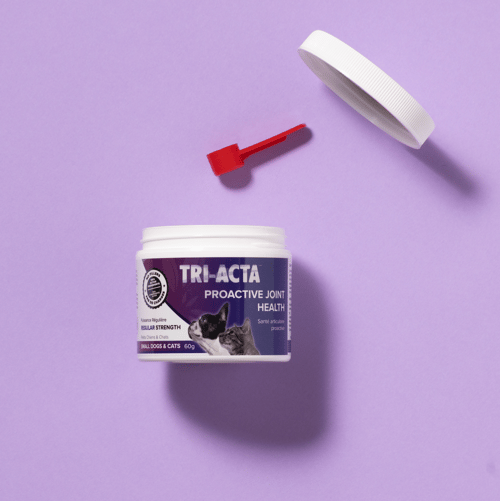

Joint Supplements for Dogs
Sections

Understanding Joint Supplements for Dogs
There are a few things that are true about man’s best friend—our dogs are living longer than ever before, and they often experience joint issues, especially as they age. The American Animal Hospital Association estimates that as many as 20% of all dogs in North America will experience some sort of joint issue in their lifetime, whether that ends up being osteoarthritis or regular joint degradation. Other sources highlight this issue, with one expert saying that 25% of dogs are diagnosed with arthritis at some point in their life and a scientific study pointing out major risk factors for dogs developing joint degradation and arthritis are not being neutered and being overweight. Of course, your dog’s breed, their age, genetics, what you feed them, and the environmental conditions in which they live are all contributing factors as well.
We all want our dogs to have happy and healthy lives, so what can you do to help prevent your pup from developing a painful joint condition?
One of the easiest preventative measures you can start implementing right away to help your dog develop stronger, healthier joints is giving them a dog joint supplement. A specially formulated canine joint supplement contains ingredients that target your dog’s joints and the structures that surround them, providing them with more of what they need to grow, repair after activity, and remain strong throughout their lifetime.
In this comprehensive guide, we explore everything you need to know about the importance of joint supplements for dogs, including common causes of mobility problems, what puts a dog at the most risk of developing a joint condition, types of joint supplements for dogs, ingredients you should look for when choosing a supplement, and more.

Hip and Joint for Dogs: What Causes Mobility Issues?
Lack of mobility in dogs due to joint issues is a multifaceted problem that affects a high percentage of dogs in North America. The reasons why dogs develop joint problems may sound simple, but the reality is that they are just as complex compared to why humans develop joint problems: sometimes, it could be because of genetics, environmental conditions, diet, or something else, but sometimes the reason is unknown.
We’ll get more into risk factors that elevate a dog’s probability of developing a joint problem later in this article, but before we get into all of that, it’s important to understand a dog’s anatomy and bone structure.
Dog Bones & Anatomy
Although dogs walk on four legs, dog bone anatomy is actually relatively similar to people. This is a good and bad thing for us as dog owners, because it means that many conditions that affect the joints that we suffer from our pups can also suffer from. But the good side is that many of the medications and other treatment options we’ve developed for people can be given to dogs directly or modified to fit their tiny bodies.
However, any abnormalities with a dog’s musculoskeletal system and sometimes just the way their skeleton is naturally very often leads to injuries that affect their joints and often result in a lifetime of issues that require careful management. Even certain diseases can result in joint problems. These potential issues are outlined in the table below:
|
Musculoskeletal Abnormality |
How it Affects Your Dog |
|
Cranial cruciate ligament rupture (CCL rupture) |
|
|
Congenital defects |
|
|
Infectious diseases of the skeletal system |
|
|
Osteoarthritis |
|
|
Metabolic and nutritional disorders |
|
|
Cancer |
|
Dogs tend to experience musculoskeletal abnormalities more frequently compared to cats. Surgical treatment may become necessary in certain instances of musculoskeletal conditions. Rehabilitation from musculoskeletal ailments or injuries typically involves a blend of pain relief, limited activity, rehabilitative therapy, weight control, and the administration of dietary supplements.
We’ll get into the different types of dog joint supplements that you can give your dog, including liquid, powder, treats, and more, and get into more detail about the ingredients. Still, one effective joint supplement that you can give your dog immediately is TRI-ACTA. As a specially formulated powdered joint supplement for dogs, TRI-ACTA is a great preventative that can be easily added to your dog’s daily diet via the included scoop. Simply sprinkle the supplement on top of your dog’s wet or dry food. Because the powder is flavourless, your dog won’t even notice the addition. Also, TRI-ACTA only contains 100% therapeutic and natural ingredients, so you’re not paying for filler or preservatives that do nothing for your dog’s joint health.
If your pup is already experiencing joint issues or just needs a bit more oomph for their joint health (like if they are a senior pup), then TRI-ACTA H.A. is a great option. The H.A. stands for Hyaluronic Acid for dogs, which thickens the synovial fluid in your dog’s joints, allowing for easier and more pain-free movement.
TRI-ACTA H.A. for Pets
Our maximum strength formula is optimally designed to accelerate the formation of cartilage, minimize inflammation, expedite the healing process, and improve joint conditions.

Dog Bone Structure
A dog’s natural bone structure highlights the importance of their joints always being in top condition.
Dog Elbow

Dogs bear 60% or more of their weight on their elbows, which could contribute to joint issues, especially later in life, or if they are a breed that tends to carry most of their weight on their front limbs, such as the English Bulldog.
Dog Femur

A dog’s femur (the longest bone in their body) connects to their joint via a ball at the top, which fits into the socket of the pelvis (hip) bone. Conditions like hip dysplasia and arthritis can affect this essential joint, leading to trouble walking and painful rising from a lying down or sitting position.
Dog Hip Joints

A dog’s hip joint consists of four separate bones (ilium, ischium, pubis, and sacrum), which connect together to form the hip joint. Malformed hips from birth, injury to the hips, or obesity can affect the hips, which, since they are at the center and connect all the legs, significantly affects how easily your dog can move.
Dog Knee

A dog’s knee can develop certain conditions that can significantly affect your dog’s movement, including stifle luxation, patella luxation, CCL tear, and more. Dogs with these conditions may bear only some weight on their leg, resulting in a strange gait and difficulty walking. Obesity can exacerbate these conditions further.
Dog Shoulder

A dog’s shoulders connect the dog’s front limbs to their trunk and provide support to the front half of their body. Any sort of developmental abnormalities, including Osteochondritis Dissecans, can result in inflammation and difficulty moving properly.
Dog Spinal Cord


Dogs Most at Risk of Joint Issues
Joint issues in dogs can significantly impact their quality of life, mobility, and overall well-being. While joint problems can affect dogs of any breed or size, certain factors predispose some breeds to a higher risk of developing these conditions. Understanding which breeds are most susceptible to joint issues as well as conditions and ailments that can lead to joint problems, is crucial for proactive management and early intervention to ensure the best possible outcomes for our furry companions.
1. Large Breeds
Larger breed dogs like Golden Retrievers and Labradors are more susceptible to joint injuries due to their size. They are also more likely to be born with conditions like hip dysplasia. Because of these facts, it’s even more important that you take preventative measures to help protect their joint health. Giving your dog a joint supplement before they develop joint problems can help keep their joints happy and healthy as they age. TRI-ACTA is a great preventative supplement that can be incorporated into a dog’s diet as early as 8 weeks old.
In addition to supplements, you should also practice mindful playtime and activities with your pup. Activities that can cause them to twist or turn suddenly can put added pressure and strain on their joints, leading to injuries. In other words, avoid the aggressive ball throw or frisbee toss and stick to running, jumping, and light games of fetch instead.
2. Obese / Fat Dogs
 Excess weight puts additional strain on a dog's joints, increasing the risk of joint problems such as arthritis and hip dysplasia.
Excess weight puts additional strain on a dog's joints, increasing the risk of joint problems such as arthritis and hip dysplasia.
Obesity can also exacerbate existing joint issues and make it more challenging for dogs to move comfortably.
Maintaining a healthy weight through proper diet and regular exercise is crucial for preventing joint issues in overweight or obese dogs.
3. Senior Dogs
As dogs age, their joints naturally undergo wear and tear, sometimes leading to conditions like osteoarthritis (especially with large and giant breed dogs). Senior dogs are more prone to joint stiffness, inflammation, and pain due to decreased mobility and the degenerative nature of aging. Providing senior dogs with joint supplements, appropriate exercise, and comfortable bedding can help alleviate joint discomfort and improve their quality of life.
4. Dogs with Preexisting Injuries

Dogs that have experienced previous injuries, such as ligament tears or fractures, are at an increased risk of developing chronic joint issues such as lameness. Injuries can disrupt the normal functioning of joints, leading to instability, inflammation, and degeneration over time. Some dogs can even experience back leg paralysis from severe arthritis or injuries to their knee joints or hips. Proper veterinary care, including rehabilitation therapy (such as a dog hip brace to help stabilize hips in dogs with hip dysplasia and provide dog hip support) and pain management, is essential for managing preexisting joint injuries and preventing further damage.
5. Congenital Joint Disorders
Certain breeds are predisposed to congenital joint disorders, such as hip dysplasia (which can lead to a dislocated hip), elbow dysplasia, and luxating patella. These conditions are often hereditary and result from abnormal development or structural abnormalities in the joints. Early detection through routine veterinary screenings and appropriate management strategies, including surgery and lifestyle modifications, can help mitigate the effects of congenital joint disorders in affected dogs.
6. Lacking Proper Nutrition
 Nutritional deficiencies or imbalances can impact joint health and contribute to the development of joint issues in dogs.
Nutritional deficiencies or imbalances can impact joint health and contribute to the development of joint issues in dogs.
Diets lacking essential nutrients like omega-3 fatty acids, glucosamine, and chondroitin sulfate may fail to support optimal joint function and repair.
Providing dogs with a balanced diet rich in high-quality proteins, vitamins, and minerals is essential for promoting overall health and reducing the risk of joint-related problems.

Dog Joint Health Options
As dog owners, we have various options available to support our canine companions' joint health, but understanding the differences between these options is essential for making informed decisions. Let's explore the distinctions between different types of dog joint remedies:
|
Dog Joint Health Option |
Description |
Usage & Benefits |
|
Dog joint supplement |
Dog joint supplements are specially formulated products designed to support and maintain joint health in dogs. These supplements typically contain ingredients such as glucosamine, chondroitin sulfate, MSM, and sometimes omega-3 fatty acids, and antioxidants. These ingredients work together to promote joint lubrication, reduce inflammation, support cartilage health, and improve mobility. |
Usage: Dog joint supplements are available in various forms, including chewable tablets, soft chews, powders, and liquids. They are often administered orally and can be given as part of your dog's daily routine. Benefits: Dog joint supplements provide targeted support for dogs with joint issues or those at risk of developing joint problems due to age, breed, or lifestyle factors. They are beneficial for promoting joint comfort, flexibility, and mobility, as well as supporting overall joint function and longevity. |
|
Joint vitamins for dogs are dietary supplements that contain essential vitamins and minerals known to support joint health. These vitamins may include vitamin C, vitamin E, vitamin D, and various B vitamins, as well as minerals like calcium, magnesium, and zinc. While vitamins alone may not directly address joint issues, they play a vital role in overall health and can complement other joint support supplements. |
Usage: Vitamins for dogs joints are typically administered orally and can be given as part of your dog's daily diet. They may come in the form of tablets, capsules, or liquid formulations. Benefits: Joint vitamins for dogs contribute to overall joint health by supporting bone density, collagen production, and tissue repair. They help maintain the structural integrity of joints and may enhance the effectiveness of other joint support supplements when used in combination. |
|
|
Dog joint medicine refers to prescription or over-the-counter medications specifically formulated to alleviate joint pain, inflammation, and stiffness in dogs. These medications for dog joint health may include nonsteroidal anti-inflammatory drugs (NSAIDs), analgesics, corticosteroids, and disease-modifying osteoarthritis drugs (DMOADs). Dog joint medicine is typically recommended for dogs with diagnosed joint conditions or those experiencing acute or chronic joint discomfort. |
Usage: Dog joint medicine is administered orally in the form of tablets, capsules, or liquid formulations. Some medications may require veterinary prescription and careful monitoring to ensure safety and effectiveness. Benefits: Dog joint medicine provides symptomatic relief from pain and inflammation associated with joint conditions such as arthritis, hip dysplasia, and degenerative joint disease. These medications help improve mobility and quality of life for dogs suffering from joint-related discomfort. |
|
|
Dog anti-inflammatory supplements or medications are specifically designed to reduce inflammation and pain associated with joint disorders. These products may contain natural anti-inflammatory ingredients such as turmeric, bromelain, ginger, MSM, and green-lipped mussel extract, as well as synthetic anti-inflammatory drugs like NSAIDs. |
Usage: Dog anti-inflammatory supplements are typically administered orally and can be given as part of your dog's daily diet. They may come in the form of chewable tablets, soft chews, powders, or liquids. Prescription anti-inflammatory medications are administered according to veterinary recommendations. Benefits: Dog anti-inflammatory supplements help alleviate joint pain, swelling, and stiffness by reducing inflammatory processes within the body. They provide relief from discomfort associated with arthritis, soft tissue injuries, and other inflammatory joint conditions. |
|
|
Joint health dog food is specially formulated canine diets that contain ingredients known to support joint function and mobility. These diets may include high-quality protein sources, omega-3 fatty acids, glucosamine, chondroitin sulfate, and antioxidants. Joint health dog food aims to provide comprehensive nutrition to promote overall joint wellness and prevent the onset of joint problems, but even the best dog joint health dog food is less effective than giving your dog a joint supplement or joint medication as the food never contains enough active ingredients to be completely effective. |
Usage: Dog food for joint health is fed as the primary diet to dogs and should be chosen based on their age, size, breed, and specific dietary needs. These diets are available in various formulations, including dry kibble, wet food, freeze-dried, and raw options. Benefits: Dog food for joint health offers a convenient and practical way to support joint health through daily nutrition. These diets provide essential nutrients that contribute to joint lubrication, cartilage health, and inflammation control, promoting optimal joint function and mobility throughout your dog's life. |

Types and Forms of Joint Supplements For Dogs
There are a variety of different formulations of the best dog joint supplements, including powders, chews, tablets or capsules, liquids, and even food with ingredients like glucosamine (though the food would not really be considered a supplement on its own). There are different reasons why dog owners would choose a certain formulation of supplement over another, like ease of administration (not every dog will easily tolerate a pill or capsule, and some dogs may prefer the texture or taste of a certain formulation over another).
Let’s take a closer look at the different formulations of hip and joint supplements for dogs:
1. Powders

Powdered joint supplements for dogs offer one of the simplest administration methods.
Typically, these supplements include a measuring scoop for precise dosing, and many options, such as TRI-ACTA products, can be conveniently sprinkled onto your dog’s wet, dry, or raw food without any hassle.
Opting for a flavorless powdered supplement, like TRI-ACTA, ensures that your dog won't detect any difference in their regular food, making it easier to incorporate into their diet.
TRI-ACTA for Pets
A proactive approach for developing and younger adult pets to maintain optimal joint health mobility, minimize inflammation and fend off age-related ailments.

Pros of Powdered Supplements
- Can be easily mixed into wet or dry food without affecting the texture or taste (provided you choose a flavourless option)
- Easy to store with a long shelf life compared to liquid or chewable supplements and doesn’t require refrigeration
- Easy to administer
- Powder is easily dissolved in your dog’s stomach, meaning little to no chance of digestive issues
- Supplements like TRI-ACTA that have 100% active ingredients ensure a low dosage amount (often between 1–2 g), lowering the chance that your dog will even notice the supplement when mixed in their food
Cons of Powdered Supplements:
- Flavoured varieties of powdered supplements may contain inactive ingredients like additives, fillers, and preservatives, which take away from the number of active ingredients per dose
- Some powdered supplements for dogs might have to be dissolved in water before serving, adding an extra step to the process
2. Liquids
Liquid joint supplements for dogs present another viable option. However, administering them can be slightly more complex than powdered supplements.

You'll need a syringe to extract the liquid from the bottle, and achieving the correct dosage, particularly when the bottle is nearly empty, may require some trial and error. Additionally, liquid dog joint supplements often incorporate extra ingredients, such as fish oil for dogs, aimed at enhancing flavor and offering additional benefits to joint and digestive health. Yet, your dog might not appreciate the fishy taste, and the inclusion of more ingredients warrants careful consideration for potential allergies and adverse reactions.
Pros of Liquid Supplements:
- Easier to administer compared to a pill or a capsule in most cases
- May be absorbed faster compared to a pill or capsule because it doesn’t need to be broken down in the stomach first
- Some liquid supplements have flavourings, which can entice your dog to take the medication
Cons of Liquid Supplements
- Dosages of liquid joint supplements for dogs are often quite high because they are diluted, increasing the chance that your dog will notice it
- More difficult to administer compared to a powdered supplement or pill because you often have to extract the correct dosage from the bottle using a syringe
- Often contains additional ingredients that may cause allergies or gastrointestinal side effects (such as flavourings, thickeners, etc.)
- Putting the liquid onto dry food will change the texture of the food (i.e., getting soggy), affecting palatability
- May need to be refrigerated, and shelf life is often shorter compared to powders and capsules
3. Chews

Chewable supplements for dogs are typically available in the form of treats or flavored tablets designed to be chewed.
They are often considered one of the simplest options for administering joint supplements because they resemble real treats, theoretically making them appealing to your pup.
However, since chews are intended to serve as a treat substitute, they often contain fillers, additives, and preservatives.
Consequently, they can contribute additional calories to your dog's diet, which may not align with your dietary preferences for your pet.
Pros of Chewable Supplements
- They are often very easy to give to your dog since they mimic real treats
- Your dog will likely enjoy eating this type of supplement the most out of all of them
- Come in many different flavours and sizes
- Often has a longer shelf life compared to liquid supplements
Cons of Chewable Supplements
- Usually always contain inactive ingredients like fillers, additives, preservatives, and binders, which may cause gastrointestinal issues for your dog—it also increases the dosage amount because of less active ingredients in each chew
- Adds calories to your dog’s diet that you may not want
- Doesn’t have as long of a shelf life compared to capsules or powders
4. Capsules or Pills

Capsule or pill form dog joint supplements are relatively uncommon in the market, likely due to their challenging administration process.
Dogs generally dislike taking pills, and once they detect a capsule hidden in a piece of cheese, they often try to avoid it while still consuming the cheese. Additionally, many capsule joint supplements for dogs that are available on the market require administering more than one capsule per dose, further complicating the process of administration.
Pros of Capsules or Pill Supplements
- Has a long shelf life compared to liquids or chewable hip and joint supplement for dogs
- Easy to store, often doesn’t require refrigeration
- You can be sure that your dog is getting the full dose as long as they swallow the entire capsule or pill
- Flavourless
Cons of Capsules or Pill Supplements
- The most difficult out of all the joint supplements for dogs options to administer
- A typical dose often consists of more than one capsule or pill
- May require you to get creative and hide the capsule or pill in a treat or favourite food item, which adds calories to your dog’s daily diet
- Is often more expensive than other supplement types from a dosage standpoint
- Not easy to find this option online or in pet stores

Ingredients to Look For in Dog Joint Treatments
The best hip and joint supplements for dogs will often contain similar main ingredients. This is because these ingredients have been proven to provide therapeutic benefits for your dog’s joint health, including relieving pain, providing better lubrication of joints, and reducing swelling of joint tissues.
The table below lists the important ingredients that you should be looking for in dog joint supplements:
|
Ingredient |
Benefit |
|
Glucosamine for dogs (HCl and Sulfate) |
There are two types of glucosamine that are often used in joint supplements for dogs:
Some dog joint supplements may tout that Glucosamine Hydrochloride is the best glucosamine, but the truth is that neither of these types of glucosamine is better than the other. Instead, each one provides unique benefits. Choosing a dog joint supplement that has both helps ensure your dog gets maximum results. |
|
Methylsulfonylmethane (MSM) |
A natural anti-inflammatory, MSM for dogs helps soothe your pup’s joints by reducing redness and swelling. |
|
Chondroitin Sulfate |
Chondroitin for dogs works in tandem with glucosamine to help repair and maintain the cartilage in your dog’s joints. |
|
Hyaluronic Acid (available in TRI-ACTA H.A) |
Hyaluronic Acid for dogs helps thicken the synovial fluid (a special fluid for lubrication) in your pup’s joints, meaning they can move easier and with less or no pain. |

TRI-ACTA H.A. for Pets
Our maximum strength formula is optimally designed to accelerate the formation of cartilage, minimize inflammation, expedite the healing process, and improve joint conditions.

Aside from the ingredients above, you might also find other unconventional ingredients listed in some joint supplements for dogs. These ingredients come from different sources and have their benefits and disadvantages. Here is a breakdown:
Green Lipped Mussel
 Green-lipped mussel extract contains a unique combination of omega-3 fatty acids, amino acids, and antioxidants that help reduce inflammation and improve joint function. They are sourced from the New Zealand green-lipped mussel, which is a unique creature to the area. The omega-3 fatty acids found in green-lipped mussels act as COX inhibitors. These compounds hinder the activity of cyclooxygenase, an enzyme responsible for producing pain-causing substances. By blocking the formation of prostaglandins, omega-3 fatty acids help reduce inflammation in the body.
Green-lipped mussel extract contains a unique combination of omega-3 fatty acids, amino acids, and antioxidants that help reduce inflammation and improve joint function. They are sourced from the New Zealand green-lipped mussel, which is a unique creature to the area. The omega-3 fatty acids found in green-lipped mussels act as COX inhibitors. These compounds hinder the activity of cyclooxygenase, an enzyme responsible for producing pain-causing substances. By blocking the formation of prostaglandins, omega-3 fatty acids help reduce inflammation in the body.
Even though green-lipped mussel is effective, there are important reasons why a dog owner might want to avoid the ingredient:
- Green-lipped mussels, characterized by their hinged two-part shell, belong to the bivalve category of animals. This classification indicates that they possess an outer covering housing a soft-bodied invertebrate. Bivalves serve as effective indicators of heavy metal pollution in marine ecosystems due to their rapid accumulation of heavy metal ions. Consequently, these metals may find their way into the end product, potentially posing risks to your dog's health.
- Green-lipped mussels are only found in one place in the world, New Zealand’s coastal and intertidal regions. These creatures are farmed because they are low in fat and they contain various beneficial fatty acids. However, to ensure that green-lipped mussels don’t become extinct, the New Zealand government has strict monitoring practices in place, including ensuring that waste products are not released into the environment from farming. While this has been successful thus far, dog owners that are concerned with using a product that could potentially negatively affect marine ecosystems may want to opt for a product with different ingredients.
- For dogs with sensitive stomachs or a history of ulcers, the consumption of green-lipped mussel supplements may exacerbate gastrointestinal issues, particularly with prolonged use.
- It’s also important to realize that a green-lipped mussel is a shellfish, making it imperative for dogs with shellfish allergies to avoid this supplement as a precautionary measure.
Fish Oil for Dogs

Some dog supplements for joint health include fish oil, which is often included because it is a good source of omega-3 fatty acids, which have a variety of benefits. These are explored in more detail below:
- Promotes healthy skin and coat: Fish oil supplements for dogs are rich in omega-3 fatty acids, such as EPA and DHA, which are essential for maintaining healthy skin and a shiny coat in dogs. These fatty acids help reduce inflammation and itching associated with skin conditions like allergies and dermatitis.
- Supports joint health: Omega-3 fatty acids in fish oil pills for dogs have anti-inflammatory properties that can help alleviate joint pain and stiffness in dogs with arthritis or other joint conditions. Regular supplementation may improve mobility and joint function, enhancing your dog's overall quality of life.
- Boosts immune function: Fish oil contains antioxidants that support a healthy immune system in dogs. By reducing inflammation and oxidative stress, omega-3 fatty acids help strengthen your dog's immune response, making them less susceptible to infections and diseases.
- Enhances cognitive function: DHA, a type of omega-3 fatty acid found in fish oil, plays a crucial role in brain development and cognitive function. Supplementing your dog's diet with fish oil may improve memory, learning, and behavior, especially in senior dogs or those with cognitive decline.
- Supports heart health: Omega-3 fatty acids have been shown to benefit cardiovascular health by reducing blood pressure, triglyceride levels, and the risk of heart disease in dogs. Fish oil may help maintain a healthy heart and improve overall cardiovascular function.
Of course, there are disadvantages to consider with fish oil for dogs. These disadvantages include:
- Risk of rancidity: Fish oil for dogs can become rancid when exposed to air, light, or heat, leading to a foul odor and taste. Rancid fish oil may also contain harmful free radicals that can cause oxidative damage to cells and tissues. To prevent rancidity, store fish oil supplements in a cool, dark place and use them before the expiration date.
- Potential contaminants: Fish used to make fish oil supplements may contain environmental contaminants like mercury, PCBs, and dioxins, which can accumulate in your dog's body over time and pose health risks. To minimize exposure to contaminants, choose high-quality fish oil supplements that undergo rigorous purification and testing processes to ensure purity and safety.
- Digestive upset: Some dogs may experience gastrointestinal upset, such as diarrhea or vomiting when first introduced to fish oil supplements for dogs. This can be attributed to the high-fat content of fish oil, which may be difficult for sensitive stomachs to digest. To reduce the risk of digestive upset, start with a low dose of fish oil and gradually increase it over time.
- Interactions with medications: Fish oil supplements for dogs may interact with certain medications, including blood thinners and anti-inflammatory drugs, potentially affecting their effectiveness or increasing the risk of side effects. If your dog is taking any medications, consult your veterinarian before adding fish oil to their regimen to avoid potential interactions.
- Allergic reactions: While fish oil is generally well-tolerated by most dogs, some individuals may develop allergic reactions to fish or seafood proteins present in the supplement. Signs of an allergic reaction may include itching, swelling, hives, or difficulty breathing. If your dog exhibits any signs of an allergic reaction after consuming fish oil, discontinue use immediately and consult your veterinarian.
CBD for Dogs
 Joint issues in dogs are extremely common, especially osteoarthritis. One of the major symptoms that you’ll notice in your dog that may indicate they are suffering from a joint condition is pain. Managing this pain is important to maintain their quality of life.
Joint issues in dogs are extremely common, especially osteoarthritis. One of the major symptoms that you’ll notice in your dog that may indicate they are suffering from a joint condition is pain. Managing this pain is important to maintain their quality of life.
Non-steroidal anti-inflammatory drugs, or NSAIDs, are one of the most common treatments that vets will prescribe to dogs in pain from a joint condition. While NSAIDs are effective, they come with side effects—things like gastrointestinal problems, kidney problems, and more can result from the long-term use of these medications. Due to this fact, it makes sense that dog owners would try to find alternative treatments with less or no side effects to relieve their dog’s pain.
CBD (cannabidiol) is a natural compound derived from the marijuana plant that offers therapeutic benefits without inducing the psychoactive effects commonly associated with marijuana. Instead of causing a "high," CBD promotes muscle relaxation, reduces anxiety, and instills a sense of calmness. By administering CBD to your dog, you can alleviate the discomfort associated with arthritis by relaxing their sore joints and muscles.
Due to its promising therapeutic properties, a plethora of CBD products tailored for dogs have emerged in the market. Among these options, CBD oil for dogs stands out as a popular choice because of its versatility. It can be easily incorporated into your dog's food or administered directly using a dropper or in pill form.
With that in mind, there are some important facts to remember when it comes to CBD for dogs:
- CBD does not treat the root cause of pain. Like NSAIDs, the best CBD products for dogs are a great way to help manage pain and reduce inflammation, but it’s important to remember that even the best cbd products don’t cure the condition that is causing your dog pain in the first place. Instead of relying on pain management alone, pairing the CBD product with the best hip and joint supplement for dogs helps fill that gap. The natural ingredients in TRI-ACTA H.A., including two types of glucosamine, chondroitin, MSM, and Hyaluronic Acid helps strengthen and repair your dog’s joints while the CBD product can help manage pain.
- CBD products for dogs are not regulated. Performing a quick Google search reveals numerous CBD products specifically marketed and sold for pets. To navigate around legal restrictions, some pet product companies label their offerings as hemp-derived, leveraging the legal status of hemp, a non-psychoactive component of the cannabis plant commonly used in various goods such as clothing. However, it's essential to note that hemp-derived CBD products are not yet approved by the FDA in the United States.
- Veterinarians can’t legally prescribe CBD for dogs in Canada or the United States. Veterinarians are legally barred from prescribing CBD products, and, as we mentioned, the ingredients used are not subject to regulatory oversight. As a result, the quality and effectiveness of these products cannot be guaranteed. A similar regulatory landscape exists in Canada, where veterinarians are unable to directly prescribe even the best CBD products for pets. Nevertheless, they may engage in discussions regarding the therapeutic use of human-grade CBD for pets and even recommend it under an "extra-label" scenario, where the drug's usage differs from the approved labeling.
Shark Cartilage for Dogs
 Shark fins, the primary source of shark cartilage for dogs, have been used for centuries by various cultures due to their health-food status of allegedly being able to improve your skin, provide joint support, boost energy, and help prevent heart disease. Shark fin soup has remained one of the most popular ways that humans get the supposed benefits from shark fins and has persisted as a sort of status-symbol dish because of its elusivity and often high price tag.
Shark fins, the primary source of shark cartilage for dogs, have been used for centuries by various cultures due to their health-food status of allegedly being able to improve your skin, provide joint support, boost energy, and help prevent heart disease. Shark fin soup has remained one of the most popular ways that humans get the supposed benefits from shark fins and has persisted as a sort of status-symbol dish because of its elusivity and often high price tag.
Science has since confirmed that shark fins contain cartilage that is chock-full of glucosamine and chondroitin, two essential ingredients for joint health. So given that humans have been consuming shark cartilage and noticing improvements to their joint health, it makes sense that we’d try giving it to our dogs as well. After all, on paper, it seems like a great choice as it’s a natural ingredient. But there are some important drawbacks:
- Joint supplements for dogs that contain shark cartilage could contain environmental toxins. Sharks, known for their longevity, have the unfortunate tendency to accumulate environmental toxins such as mercury throughout their lives. These toxins, including mercury and beta-methylamino-L-alanine, can be present in shark cartilage products. Both substances have a range of adverse effects, from mild issues like muscle weakness and memory loss (albeit arguably mild) to more severe consequences such as paralysis, impaired hearing, and vision problems. Together, they form a hazardous combination, posing a significant risk to the nervous system with each dose of shark cartilage consumed.
- The legalities of shark cartilage farming is suspect at best. Due to the barbaric practice of “finning”, Canadians cannot purchase domestically sourced shark cartilage, but the importation of shark cartilage has remained unrestricted until 2019. Presently, there are 32 countries and jurisdictions globally that have implemented full or partial bans on shark finning, along with an additional 22 that have enacted similar measures concerning shark fishing in general. But that doesn’t mean that shark cartilage products are difficult to get. The legalities surrounding the direct sale of these products is still a grey area in Canada and the USA, meaning that people can purchase these products online rather easily. To ensure that the product you are purchasing does not contain shark cartilage as its source of chondroitin, check the label or contact the manufacturer. The best dog supplements for joints will freely list their sources on their website or label.
- Shark cartilage farming has a devastating impact on marine ecosystems. Every year, an estimated 73 to 100 million sharks face death worldwide, primarily for the sake of their fins. This staggering number has led to the functional extinction of certain shark species in various regions. However, the consequences of human activities extend beyond the sharks themselves. Sharks are apex predators, so the removal of them has a cascading effect on the marine ecosystems in which they live. When sharks are removed, it results in an abundance of other creatures like rays and skates, which in turn eat more scallops and oysters, devastating those populations. Scallops and oysters help filter harmful substances out of the water, so the lack of those creatures affects the water quality, which impacts birds, humans, and countless marine life.
The best and most obvious course of action in this case is to choose chondroitin for dogs that sources it from a more ethical source, such as bovine, instead.

Evaluation Criteria in Determining the Best Dog Joint Supplements
Below are the eight factors we considered when compiling this ranking of the supplements that provide the best joint support for dogs.
Price
While most dog owners are willing to pay a lot to ensure the health of their beloved pup (a recent Forbes analysis found that dog owners in the US spend about $1,533 annually on their pup), it’s always a good idea to make sure that you’re getting the most bang for your buck when it comes to any products that you’re purchasing for your pets.
In terms of price for joint supplements for dogs, it’s important to look at the amount of product you are getting versus the serving amount. Joint supplements in the pet industry are notorious for containing a low amount of therapeutic ingredients, or ingredients that actually help your dog’s joints, rather than just being there to hold the product together or to make it more palatable to your dog and you. In fact, joint supplements for dogs and cats typically contain 50–80% inactive ingredients. These are things like fillers, additives, and preservatives. When a dog joint supplement is mostly inactive ingredients, it means that the dosage has to be higher (which results in you spending more) and your dog is getting a ton of extra calories and other useless additions to their diet that they may not need.
So when it comes to price, look for a product with a low serving size that clearly lists the ingredients they use and how much of each ingredient is in a container or dose. That way, you can easily calculate how much you’re paying per serving.
Ingredients

A joint supplement for dogs is only as good as the substances it contains. There are a few key ingredients that you should be looking for when you’re evaluating the dog supplements you want to purchase for your pup to improve their joint health.
The important thing to remember when it comes to ingredients in a joint supplement for dogs is the therapeutic amount. The recommendations on what level of ingredients is therapeutic can vary. Every dog is different and with some, lower amounts will provide relief, while with others a higher dose may be needed.
In general, therapeutic amounts of the main ingredient glucosamine are as follows:
|
Dog’s Weight Range |
Amount of Glucosamine Per Dose |
|
Dogs less than 25 lbs (11.4 kg) |
Between 250–500 mg of glucosamine |
|
25–50 lbs (11.4–22.7 kg) |
At least 500 mg |
|
50—90 lbs (22.7–41 kg) |
At least 1000 mg |
|
90 lbs+ (41 kg) |
At least 1,500 mg |
It’s important to note that glucosamine and chondroitin are almost always given together because when digested at the same time, they will provide the most benefits for your pup. As long as the chondroitin is listed in the ingredients on the label, you should be good to go.
Similarly, the amount of MSM is also based on your dog’s weight:
|
Dog’s Weight Range |
Amount of MSM Per Dose |
|
Dogs less than 10 lbs (about 4.5 kg) |
Less than 375 mg |
|
10–35 lbs (4.5–16 kg) |
375 mg |
|
35–75 lbs (16–35 kg) |
500 mg + |
|
75–100 lbs (35–50 kg) |
750 mg + |
Keep in mind that most products, including TRI-ACTA, will list the recommended dosage amount based on your dog’s weight on the packaging and on their website. You might have to do a quick calculation if you want to determine how much of each ingredient in the dog joint supplement your pup is getting.
TRI-ACTA H.A. for Pets
Our maximum strength formula is optimally designed to accelerate the formation of cartilage, minimize inflammation, expedite the healing process, and improve joint conditions.

Ingredients Source
When assessing the best dog joint supplements, one crucial criterion to consider is the source of ingredients. Here's how ingredient source influences the evaluation process:
- Natural and high-quality sources: Look for supplements that source their ingredients from natural and high-quality sources. Ingredients derived from reputable sources, such as organic farms or sustainable fisheries, are often of higher quality and purity. For example, glucosamine sourced from shellfish or chondroitin sulfate from bovine cartilage should be obtained from trusted suppliers with rigorous quality control measures.
- Purity and contaminant-free: Ensure that the ingredients are free from contaminants, toxins, pesticides, heavy metals, and harmful additives. Choose supplements that undergo thorough testing and certification to guarantee purity and safety. Look for products that are labeled as free from artificial preservatives, colors, and flavors.
- Ethical and sustainable sourcing practices: Consider the ethical and sustainability practices of ingredient sourcing. Look for supplements that prioritize ethical treatment of animals and environmentally responsible sourcing methods. For example, fish oil derived from wild-caught, sustainably harvested fish ensures minimal impact on marine ecosystems.
- Transparency and traceability: Opt for supplements that provide transparency and traceability regarding ingredient sourcing. Manufacturers should disclose the origins of their ingredients, including the specific species or plant varieties used. Look for products that provide detailed information about the sourcing process, including quality control measures and certifications.
- Allergen-free options: If your dog has known allergies or sensitivities, choose supplements that offer allergen-free alternatives. For example, some supplements offer vegetarian or hypoallergenic formulations that exclude common allergens like gluten, dairy, soy, or shellfish. Check the product label for allergen statements and consult with your veterinarian if unsure.
Manufacturer Reputation and Quality Assurance
 There are thousands of dog joint supplement manufacturers out there. And not all of them are in it for the right reasons.
There are thousands of dog joint supplement manufacturers out there. And not all of them are in it for the right reasons.
There are a few tell-tail (see what we did there?) signs that you can look for to help you choose a brand that you can trust:
- Look for designations on the packaging that indicate that the product is high-quality. For example, the Veterinary Health Product designation in Canada can be applied for by companies that want to showcase their commitment to the quality and efficacy of their joint health supplements for dogs. To achieve this designation and become a vet recommended joint supplement for dogs, the product must follow Good Manufacturing Practices (GMP), meaning that the product is made with ingredients that are vetted and reliable, and have evidence behind them that supports their use for a certain therapeutic benefit. In this case, that would mean joint support.
- Ensure that the supplement comes from a reputable source. Supplements made for humans and animals are not regulated by the FDA in the United States. What this means is that some dog supplements may not list all the ingredients on their label or may be misleading with the amount of ingredients. In Canada, animal supplements are also not completely regulated, but the Veterinary Health Product program can help you identify quality products.
- Learn how to read a supplement label. Different manufacturers will list their ingredients and dosages in different ways, so it’s important to understand how to read the label on the dog joint supplement properly to ensure that you understand the difference between active and inactive ingredients in a supplement. In general, a company that’s reputable will be transparent about what’s in their product and have a clear list of all ingredients on the label along with amounts.
- Read customer reviews and feedback. Other dog owners who have purchased and used the product will often leave reviews about their experience. Be sure to read a wide range of reviews so that you can get a clear overview of the sentiment behind the product.
Customer Service and Post-Sale Support
Your experience doesn’t end with buying a supplement, and neither should the customer support you receive. Companies that care deeply about animals also care about their owners. It should be easy to contact them and ask them any questions you might have, either by email, phone, or online chat.

9 Best Joint Supplement for Dogs
As our beloved canine companions age, they may experience joint issues that affect their mobility and quality of life. Whether your dog is a senior citizen or still in their prime, finding the right joint supplement can make a significant difference in their overall health and well-being. In this section, we'll explore the best joint supplements tailored to different stages of a dog's life and specific health needs.
Senior Dog Joint Supplements
As dogs age, their joints undergo wear and tear, leading to conditions like osteoarthritis and reduced mobility. Senior dog joint supplements are specially formulated to support aging joints and alleviate discomfort.
1. TRI-ACTA H.A.

- TRI-ACTA H.A. is a powdered joint supplement containing two types of glucosamine (Sulfate and HCl), ensuring that your dog gets the maximum benefit from the supplement.
- It also contains Hyaluronic Acid for dogs, which thickens the synovial fluid in your dog’s joints, allowing for easier and more pain-free movement.
- Contains 100% active and natural ingredients, so dosages are low, ensuring you are not paying for fillers and additives and that your pup gets the most benefit from each dose.
- Approved by Health Canada as a Veterinary Health Product.
TRI-ACTA H.A. for Pets
Our maximum strength formula is optimally designed to accelerate the formation of cartilage, minimize inflammation, expedite the healing process, and improve joint conditions.

Starts at $27.99 CAD for a 60 g container. Pricing as of March 2024.
2. Zest Paws Senior Advanced Multivitamin Bites

- Zesty Paws Senior Advanced Multivitamin Bites are comprehensive supplements designed to support the overall health and well-being of senior dogs.
- Features a blend of vitamins, minerals, antioxidants, and digestive enzymes to promote immune system function, cognitive health, and digestion.
- Contains OptiMSM and Qmin+ Curcumin to support joint comfort and mobility in aging dogs.
- Made with natural ingredients and free from artificial preservatives, colors, and flavors, but does contain some filler product in order to be taken in a chew format.
Starts at $54.09 CAD for 90 bites. Pricing as of March 2024
3. VetriScience GlycoFlex Plus

- GlycoFlex Plus by VetriScience is a clinically proven joint support formula specifically formulated for senior dogs.
- Contains glucosamine, MSM, chondroitin, and DMG (dimethylglycine) to promote joint comfort and mobility.
- Features green-lipped mussel as a natural source of omega-3 fatty acids and antioxidants to support joint health and reduce inflammation.
- Available in chewable tablets that are easy to administer and highly palatable for senior dogs, again some filler is contained in order to be taken in this format.
Proactive Dog Joint Supplements
Proactive joint supplements are suitable for dogs of all ages and are designed to support joint health and prevent the onset of joint problems. These supplements often contain ingredients that promote cartilage repair and maintain joint function.
1. TRI-ACTA

- A powdered dog joint supplement that contains two types of glucosamine (Sulfate and HCl), ensuring that your dog gets the maximum benefit from the supplement
- All-natural ingredients and no fillers, preservatives, or additives mean that your dog is getting the maximum value from each dose and keeps dosages small
- Each dose contains 100% active, therapeutic ingredients
- Can be given to dogs as early as 8 weeks old as a preventative measure for future joint issues
Approved by Health Canada as a Veterinary Health Product
TRI-ACTA for Pets
A proactive approach for developing and younger adult pets to maintain optimal joint health mobility, minimize inflammation and fend off age-related ailments.

Starts at $23.99 CAD for a 60 g container. Pricing as of March 2024.
2. PetHonesty Hemp Mobility Soft Chews

- PetHonesty Hemp Mobility Soft Chews are proactive joint supplements infused with hemp seed oil and organic hemp powder to support joint health and mobility in dogs.
- Contains glucosamine, turmeric, and green-lipped mussel to reduce inflammation and promote joint comfort in proactive joint care.
- Features a soft, chewy texture and a delicious duck flavor that dogs enjoy, making it easy to administer daily.
- Made with premium-quality, all-natural ingredients and free from GMOs, corn, soy, and artificial additives.
3. Nutri-Vet Hip & Joint Plus Dog Chewables

- Nutri-Vet Hip & Joint Plus Dog Chewables are proactive supplements designed to support joint health and mobility in dogs of all ages.
- Contains a blend of glucosamine, chondroitin, MSM, and vitamin C to promote cartilage health and reduce inflammation.
- Features a liver-flavored chewable tablet form that is easy to administer and highly palatable for dogs. May need to hide it in a pill pocket, cheese, or crush up in order to administer for picky dogs.
- Suitable for daily use as part of a proactive joint care regimen to maintain optimal joint function and mobility
$52.99 CAD for 90 chewables. Pricing as of March 2024.
Natural Supplements for Dogs with Arthritis
Dogs with arthritis can benefit from natural joint supplements that provide relief from pain and inflammation without the side effects of pharmaceutical medications. Natural supplements often contain plant-based ingredients known for their anti-inflammatory and analgesic properties. However, it’s important to note that the therapeutic benefits of plant-based supplements can’t be guaranteed. Even if you grow two plants side by side in the same conditions and with the same daily care, you can’t guarantee that both plants will contain the exact same properties.
1. Zesty Paws Turmeric Curcumin Bites

- Zesty Paws Turmeric Curcumin Bites are natural supplements for dogs with arthritis that harness the anti-inflammatory properties of turmeric.
- Contains organic turmeric, curcumin extract, coconut oil, and BioPerine to support joint health, reduce inflammation, and alleviate pain associated with arthritis.
- Features a soft chewable form with a delicious duck flavor that dogs love, making it easy to administer daily.
- Free from artificial ingredients and grain, making it suitable for dogs with sensitivities or allergies.
$40.58 CAD for 90 chews. Pricing as of March 2024.
2. Ready Pet Go! Joint Support for Dogs

- Ready Pet Go! Joint Support for Dogs is a natural joint supplement made with glucosamine, chondroitin, MSM, organic turmeric, and green-lipped mussel to support joint health and mobility.
- Provides comprehensive joint support by promoting cartilage repair, reducing inflammation, and supporting overall joint function.
- Features a soft chewable form with a tasty bacon flavor that dogs love, making it easy to administer daily as a treat.
- Made in the USA with premium, natural ingredients and free from artificial additives, fillers, and preservatives.
$35.32 CAD for 90 soft chews. Pricing as of March 2024.
3. Grizzly Joint Aid Liquid

- Grizzly Joint Aid Liquid is a natural joint supplement for dogs made from wild Alaskan salmon oil and krill oil to support joint health and reduce inflammation.
- Contains a blend of natural ingredients such as glucosamine, chondroitin, MSM, hyaluronic acid, and turmeric to promote joint lubrication, reduce inflammation, and support mobility.
- An easy-to-administer liquid formula that can be added to your dog's food for convenient daily supplementation.
- Made from sustainably sourced, high-quality ingredients with no artificial additives or preservatives.
$49.99 for 474 ml. Pricing as of March 2024.

Conclusion
Ensuring the joint health of our canine companions is paramount for their overall well-being and quality of life. With the prevalence of joint issues in dogs, ranging from arthritis to congenital disorders, proactive measures are essential for maintaining their mobility and comfort. Joint supplements for dogs play a crucial role in supporting joint health by providing targeted nutrients and ingredients to promote cartilage repair, reduce inflammation, and improve mobility.
Understanding the common causes of mobility issues in dogs, such as musculoskeletal abnormalities and congenital defects, is key to identifying the most appropriate joint supplement for your furry friend. Factors such as age, breed, lifestyle, and existing health conditions also influence the choice of joint supplement and treatment approach.
By incorporating joint supplements into your dog's daily routine, you can help prevent the onset of joint problems and alleviate existing symptoms associated with arthritis and other joint disorders.
If you’re looking for a great preventative joint supplement for dogs, TRI-ACTA is a great choice. For dogs that already have joint issues and need a bit of extra support, TRI-ACTA H.A. is recommended.
Purchase TRI-ACTA or TRI-ACTA H.A. online, or learn where to buy at a store near you.
TRI-ACTA H.A. for Pets
Our maximum strength formula is optimally designed to accelerate the formation of cartilage, minimize inflammation, expedite the healing process, and improve joint conditions.


